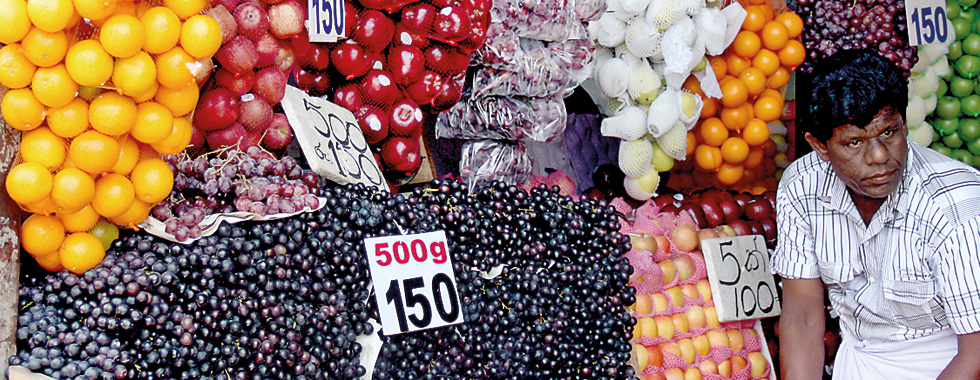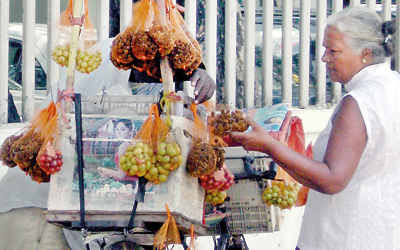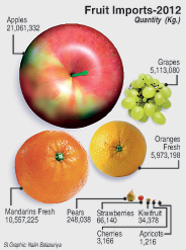News
An apple a day in Sri Lanka may not keep the doctor away
The premier organisation representing the largest volume of doctors in the country, the Government Medical Officers’ Association (GMOA) issued a warning to the public on the consumption of imported fruits as they suspect chemicals used in the fruits may be injurious to health.

Colourful but could be harmful: Wherever one looks imported fruits are freely available. Pix by Athula Devapriya
GMOA Assistant Secretary Dr. Nalin Ariyaratne said though there is no research evidence of harmful effects from consuming imported fruits such as apples, grapes and oranges, the fruits that remain on shelves for about nine months is suspect.
“Apart from edible wax, we believe that there are chemicals used to prevent rotting for many months.
We have found that the time span between apples being picked in Australia and purchased in Sri Lanka is about nine months,” he said adding that apples lead in the list of top pesticide-laden fruits followed by strawberries and grapes. According to Washington Toxic Coalition, insectide carbaryl is widely used in the US on apple and grape crops and pesticides including organophosphate and carbamate can have effects on the nervous system, with symptoms including weakness, breathing trouble, cramps, nausea, and vomiting.
“Sri Lanka does not have laboratory facilities to check into chemical preservatives especially harmful chemicals that are used on these fruits to be kept on the shelves for a long time. There is no such detection system in the Customs or with the Health Ministry,” he said.
Dr. Ariyaratne said that they have requested the Industrial Technology Institute (ITI) to provide facilities to check the chemicals and pesticides used in imported fruits and requested public to shift to local fruits until test reports on imported fruits are conducted.

Local fruits: Not that easy to get
Last year, the country imported 21 million kg of apples costing Rs. 1.8 billion, 5.9 million kg of oranges spending Rs. 511 million and 5.1 million kg of grapes purchased at Rs. 1.1 billion. When a child falls sick or is told that he or she lacked nutrition, parents turn to fruits in addition to other food and invariably imported fruits are more easily available than locally-grown fruit.
Nutrition Specialist and Senior Lecturer in Physiology at Colombo Medical Faculty Dr. Angela de Silva told the Sunday Times that without the indication of a best-before-date, these fruits lie on shelves for three to four months sometimes not even at the proper storage temperature.
Dr. de Silva who is also the President of the Nutrition Society of Sri Lanka said these imported fruits are found everywhere whether it’s opposite hospitals, in roadside boutiques, fruit shops or supermarkets. She added that these imported fruits displayed attractively and temptingly have a big demand. However, if not stored under proper temperature these fruits would lose their nutritional value and have only minimal percentage of fibre, vitamins and other nutrients.
“We say Indian gooseberry is good for one’s health, but finding it isn’t easy. People therefore tend to purchase something found easily like apples,” she said. Pointing out that although Sri Lanka has a wide range of tropical fruits compared to the few grown in European and other cold climate countries Dr. de Silva said, “With imported fruits available everywhere and the idea that apples and oranges are more healthier and ideal for children, patients and the elderly the demand for local produce has gradually decreased.”

Dr. Angela de Silva
Local fruits such as green oranges, banana, mangoes, guava, papaya, avocado, ambarella (spondias dulcis), Indian gooseberry (aamla or bitter nelli), rose apple (jambu), bael fruit (beli), local olives, locally-grown strawberries, water melon are some of the fruits that can replace the imported ones.
Specialist in Human Kinetics and wellness advisor Dr. Asanga Wijayaratne said invariably fruits that are rejected in western countries are exported to countries like Sri Lanka, Bangladesh and Indonesia.
“Fresh fruits lose their original nutritional value within seven days. The first, fresh lot is usually used for consumption in the country of origin, the second batch is used for juices while third and fourth batches are exported to Asian and African countries,” he said.


